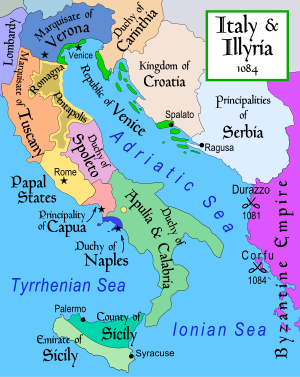Vitale Faliero
Vitale Faliero | |
|---|---|
 Coat of arms of Vitale Faliero | |
| Doge of Venice | |
| In office 1084–1095 | |
| Personal details | |
| Born | Unknown |
| Died | 1095 |

Vitale Faliero Dodoni (also known as Falier de' Doni) and usually known in English as Vitale Falier was the 32nd Doge of Venice from 1084 until his death in 1095.
Life
[edit]Vitale Faliero was a member of a noble Venetian family, probably from Fano, the son of Angelo, procurator of San Marco, and Candiana Sanudo, daughter of Vitale Sanudo.[1] A ducal councillor, he was elected Doge after the revolt that overthrew Domenico Selvo in December 1084.
According to the Venetian historian Andrea Dandolo, Vitale Faliero initiated the revolt. However, John Norwich doubts this assumption since Dandolo lived 250 years later and his chronicle about this time is quite inaccurate.
Vitale Faliero is the first Doge whose image is known, being allegedly portrayed next to the high altar of St. Mark's Basilica.
When he became Doge, Venice was supporting the Byzantine Empire in the war against the Normans under Robert Guiscard (see Siege of Durazzo). In the spring of 1095, the Venetian fleet obtained a great naval victory at Butrint (in modern-day Albania) that avenged Selvo's defeat at Corfu. The recovery in the prestige of the city is testified by the visit of Emperor Henry IV, to whom it was allied during the Investiture Controversy against the pope, for the consecration of St. Mark's church, the rebuilding of which was completed at this time.
During the latter part of his reign the city was hit by an earthquake, a sea storm, and a heavy famine.
Faliero died in December 1095. He was married to Cornella Bembo.[2] His son Ordelafo became a subsequent Doge.
Sources
[edit]- Rendina, Claudio (1989). I dogi. Storia e segreti. Rome: Newton Compton.
References
[edit]- ^ Ducal Families of Venice, Il Palazzo Ducal di Venezia, Vol. IV, by Francesco Zanotto, Venezia 1861
- ^ Staley, Edgcumbe: The dogaressas of Venice : The wives of the doges. London : T. W. Laurie
